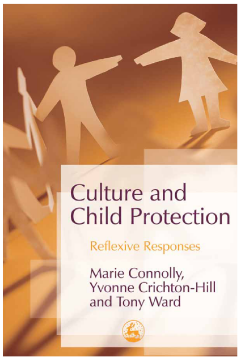
Additional Information
Book Details
Abstract
Providing services that are culturally relevant is an ongoing challenge for practitioners, managers, and policy-makers within the social services. Culture and Child Protection is a concise exploration of the close links between social service practices and cultural values which offers a culturally sensitive model of child protection practice.
The authors demonstrate the ways in which a combination of personal, professional and societal attitudes often influence practice decisions. In a context where children from ethnic minorities dominate the welfare statistics of the Western economies, the authors argue against a reliance on rigid approaches to working with particular ethnic groups. They propose effective alternative strategies that will assist social workers in responding appropriately to diverse cultural needs and circumstances. Implications of cultural difference are also considered with respect to class, socio-economic group, gender and age, reinforcing the need to recognise broader interpretations of difference within practice. This book is full of integrated examples and case studies and also discusses wider practice issues, such as working with offenders, the impact of funding restraints and the dynamic of reflexivity in practice and supervision.
Culture and Child Protection is a key text that will help social workers and culture academics to understand the ways in which cultural thinking affects and shapes child protection practice.
The book has been written for both practitioners and researchers in the domain of child protection. It is also concerned, as previously mentioned, with offenders against children and such offenders are viewed in a compassionate light since very few actively seek to hurt children, albeit their offences against children are likely to be damaging. The aim of the book is to contribute positively towards the protection of children, families and improving the relationships of children, families as well as offenders against children.
Police Journal and Internet Law Books Review
Dr Marie Connolly holds the position of Chief Social Worker within the New Zealand government. Until recently she was Associate Professor and Director of the Te Awatea Violence Research Centre at the University of Canterbury, Christchurch, New Zealand. She has published four other books including Effective Participatory Practice: Family Group Conferencing in Child Protection and New Zealand Social Work: Contexts and Practice. Yvonne Crichton-Hill is a New Zealand-born Samoan and is a lecturer with the Department of Social Work at the University of Canterbury. She has extensive experience of working in the areas of child protection social work and youth justice, and in particular work with Samoan families. She is committed to the development of practice models that are responsive to cultural values and experience. Yvonne has previously published in the area of cross-cultural practice and ethnocentric explanations of domestic violence. Dr Tony Ward is Professor in Forensic Psychology in the Department of Criminology, and Adjunct Associate Professor in the Department of Psychology at the University of Melbourne. He has extensively published on male sex offending, and, with D. Richard Laws and Stephen M. Hudson, recently edited Sexual Deviance: Issues and Controversies.
The book offers a thoughtful analysis of the complexity of child protection work and of the influence of the specific cultural contexts, of practitioners and clients alike, on effective child protection decision-making. It offers approaches for valuing both the professional initiative of workers and the inclusion of clients in service provision.
Community Care
I enjoyed reading this book. It covered more than I initially thought it would. The reader is comfortably and systematically introduced to the possibility of considering the meaning and implications of culture in child protection work.
Te Awatea Review
Table of Contents
| Section Title | Page | Action | Price |
|---|---|---|---|
| Abbreviations and Acronyms | |||
| 1. Nepal Chaper | |||
| 2. Interlude | |||
| 3. Bhutan Chapter | |||
| 4. Future outlook | |||
| 5. Evolution and Milestones | |||
| 6. Impact Assessment | |||
| 7. Learning | |||
| 8. Looking Back | |||
| 9. Looking Forward |
